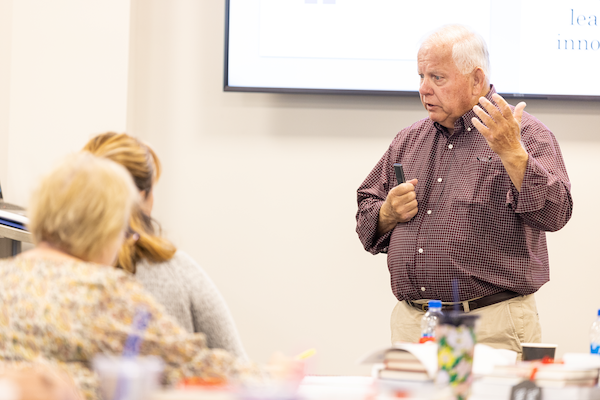Executive Doctorate Program: A Glimpse into the First Course

Week 1: The Dissertation Journey, Week 2: Residency, Week 3: Who You Are, Is How You Lead, Week 4: Total Leaders (Leadership 101), Week 5: Five Domains & Pillars of Leadership, Week 6: Pause, Think & Review, Week 7: Innovation, Influence & Change, Week 8: Learning and Organizations
Sawubona! My name is Pat Crawford, and I facilitate DOL711: Introduction to Executive Leadership and Innovation course.
The traditional Zulu greeting, Sawubona, is one I've chosen as a way to welcome students to the first course and the doctoral program at Saint Francis University. This term carries a powerful message: I see you, you matter to me, and I value your presence. Sawubona emphasizes a central leadership principle: directing our consideration toward another person without prejudice. It invites us to think knowingly of others' needs and grant importance to individuals within a group. Sawubona guides the interactions between the course facilitator and the students. This guiding principle also encourages the development of long-term relationships between and among the cohort members.
It's my pleasure to welcome the candidates beginning their journey to pursue a Doctorate in Leadership and Innovation at Saint Francis University. The course covers many aspects of leadership from an interdisciplinary standpoint, which will be explored through the eight modules that have been apportioned for the eight weeks of the course.
Since learning is a social and personal process, collaboration, reflection, and practice are learning strategies employed. The modules support cognitive, behavioral, and emotional learning. The doctoral students will gain new information and hone their skills while examining their beliefs and values.
The course is divided into two parts. Firstly, it is a graduate-level introduction to leadership from an interdisciplinary perspective. Secondly, it provides an orientation to the program’s requirements for doctoral study.
The main focus of the course is to achieve both explicit and implicit learning. Explicit learning involves understanding concepts consciously, while implicit learning occurs subconsciously. Through reflection on their experiences, the students will recognize explicit and implicit learning opportunities.
The instructional techniques for this doctoral program draw upon established adult learning principles (andragogy). The work and expectations for the students participating in the doctoral program are challenging and demanding. A fundamental purpose of this program is to help each student to become a self-directed learner (heutagogy). Each person determines and manages their learning as they progress toward the dissertation.
Course Goals
On successful completion of this course, the students will be able to:
- Through careful research, define executive leadership, organizational development, and innovation in their field of practice.
- Understand the foundations of dissertation research - including literature review, concept development, and research questions.
- Grasp the processes involved in forming a research topic, constructing a conceptual framework, generating research ideas, and formulating problem statements relevant to their field of practice.
- Showcase academic writing proficiency by creating annotated bibliographies and forming research questions around executive leadership, organizational development, and innovation.
- Understand how personal values, beliefs, and character influences leadership.
- Practically use the five domains of leadership and performance roles in their current leadership roles.
- Outline the meaning of innovations and recognize the procedures tied to leading change.
- Explain the relationship between leading and influencing.
- Illustrate why the leader's prime ambition should be to generate a learning organization.
- Demonstrate the capacity to think empirically like a scholar.
The journey to completing a dissertation is hard work that requires personal sacrifices, but the payoff is an incredibly transforming experience. When a doctoral student begins the dissertation journey, the initial course experience can impact their success. If they complete the course with a positive experience, they are more likely to have the confidence and determination to persevere and remain motivated to graduate. The first course provides the roadmap and compass for the journey; it's up to each scholar to find his or her pathway to enjoy the journey and arrive at the desired destination.
About the Author
Dr. Pat Crawford is a faculty member in SFU's Ed.D. program. His career includes teacher, principal, and superintendent. He was the Pennsylvania Leadership Development Center Director and Director of Professional Development for the Pennsylvania Association of School Administrators. Currently, he develops and facilitates leadership courses and is an executive leadership coach.
